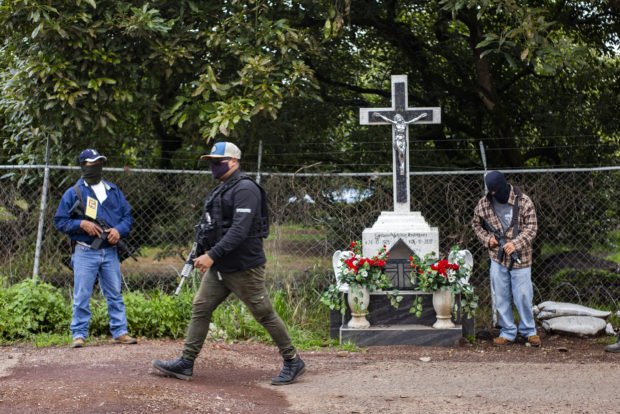US, Mexico seek to revamp fight against drug cartels

Members of the self-defense group Pueblos Unidos carry out guard duties in the protection of avocado plantations, whipped by drug cartels that dominate the area, in Ario de Rosales, state of Michoacan, Mexico, on July 8, 2021. – Peasants have organized against the harassment of drug traffickers, whose violence has intensified in the country. (Photo by ENRIQUE CASTRO / AFP)
Mexico City, Mexico — The United States and Mexico on Friday vowed to overhaul their joint fight against drug cartels, during a visit by a high-level delegation including US Secretary of State Antony Blinken.
President Andres Manuel Lopez Obrador has said Mexico no longer wants helicopter gunships and other weapons to combat drug traffickers, urging the United States to invest in regional economic development instead.
On his first visit to Mexico as the top US diplomat, Blinken, accompanied by officials including US Homeland Security Secretary Alejandro Mayorkas, held a working breakfast with Lopez Obrador followed by the main security talks.
Lopez Obrador hailed a “new phase” in relations, reiterating an invitation to US President Joe Biden to visit Mexico.
Washington has indicated that it is ready to revamp a 13-year-old program called the Merida Initiative that provided US military firepower, technical support, and security training.
Article continues after this advertisement“After 13 years of the Merida Initiative, it’s time for a comprehensive new approach to our security cooperation, one that will see us as equal partners in defining our shared priorities, tackle the root drivers of these challenges, like inequity, like corruption, and focus not only on strengthening law enforcement but also public health, the rule of law, inclusive economic opportunities,” Blinken said.
Article continues after this advertisementHe said more needed to be done to disrupt arms trafficking, strengthen port and border security, dismantle the cartels’ financial systems, root out impunity, tackle human rights abuses, and address public health issues such as addiction.
Mexican Foreign Minister Marcelo Ebrard said it was time to say “goodbye to the Merida Initiative, welcome to the Bicentennial Agreement” — a reference to the Latin American country’s recent 200th independence anniversary.
The United States has given Mexico about $3 billion since 2008 for law enforcement training and equipment such as Black Hawk helicopters.
Lopez Obrador argues that investing in development projects in the region would help counter not only drug trafficking but also migrant flows — another major challenge facing the two countries.
Underscoring the magnitude of the crisis, Mexican authorities said Friday they had detained 652 undocumented migrants, more than half of them children, traveling toward the US border in refrigerated truck containers.
Merida Initiative ‘dead’
Mexico will use the talks to push for steps to speed up extraditions between the two countries and reduce the flow of arms from the United States, Foreign Minister Marcelo Ebrard said this week.
In August, Mexico filed an unprecedented lawsuit against major US gunmakers in a Boston court over illegal cross-border arms flows that it blames for fueling drug-related violence.
Mexico is plagued by cartel-related bloodshed that has seen more than 300,000 people murdered since the government deployed the military in the war on drugs in 2006.
Many experts believe the strategy of militarization has failed because it has resulted in the cartels being fragmented into smaller, more violent cells, while drugs continue to flood into the United States.
The new security framework will focus “not just on crime, but also on the underlying cause of crime,” a senior US administration official said.
“We’re going to be looking at ways we can increase joint efforts to decrease demand for narcotics,” he said.
The two countries would continue to pursue the cartels, including their laboratories and supply chains, the official said.
But the new strategy would put more emphasis on stopping flows of firearms and drug money from the United States to Mexico, in order to “deny revenue to these cartels,” he added.
Forging a new joint strategy will not be easy, said Michael Shifter, president of the US-based think-tank Inter-American Dialogue.
“The Merida Initiative is indeed dead,” he said.
“Mexico is expected to press for significant US assistance and investment in the southern part of the country, but with budget pressures and other priorities in Washington, US officials are unlikely to be receptive,” he said.